Professional and Academic Skills for Business: Personal Development Plan and Data Collection Reflection
VerifiedAdded on 2023/06/08
|15
|5162
|87
AI Summary
This article discusses personal development plan and data collection reflection for professional and academic skills for business. It covers the goals, weaknesses, and development actions for career development. The article emphasizes the importance of effective communication, critical thinking, and problem-solving skills for achieving success in any career field.
Contribute Materials
Your contribution can guide someone’s learning journey. Share your
documents today.
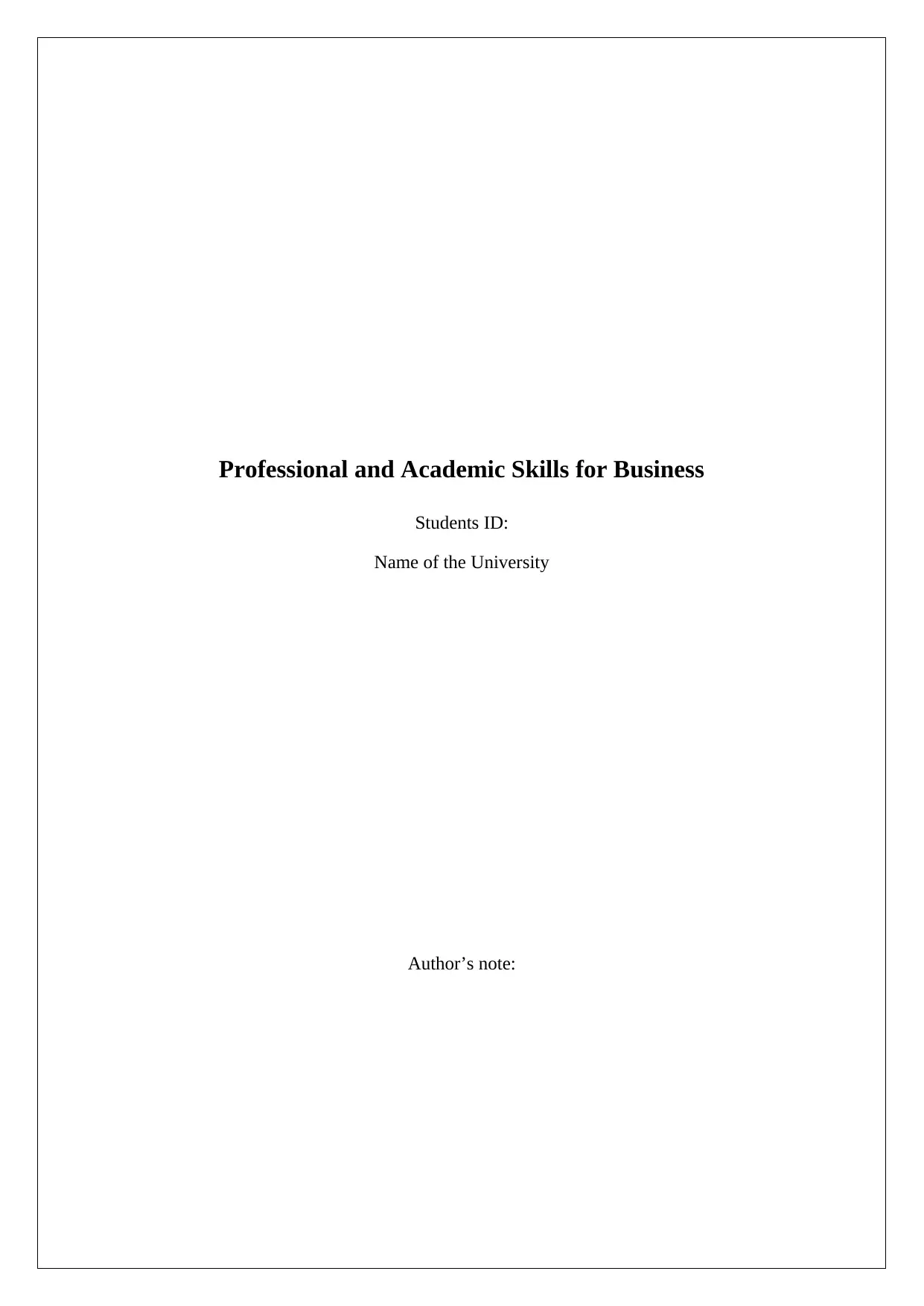
Professional and Academic Skills for Business
Students ID:
Name of the University
Author’s note:
Students ID:
Name of the University
Author’s note:
Secure Best Marks with AI Grader
Need help grading? Try our AI Grader for instant feedback on your assignments.
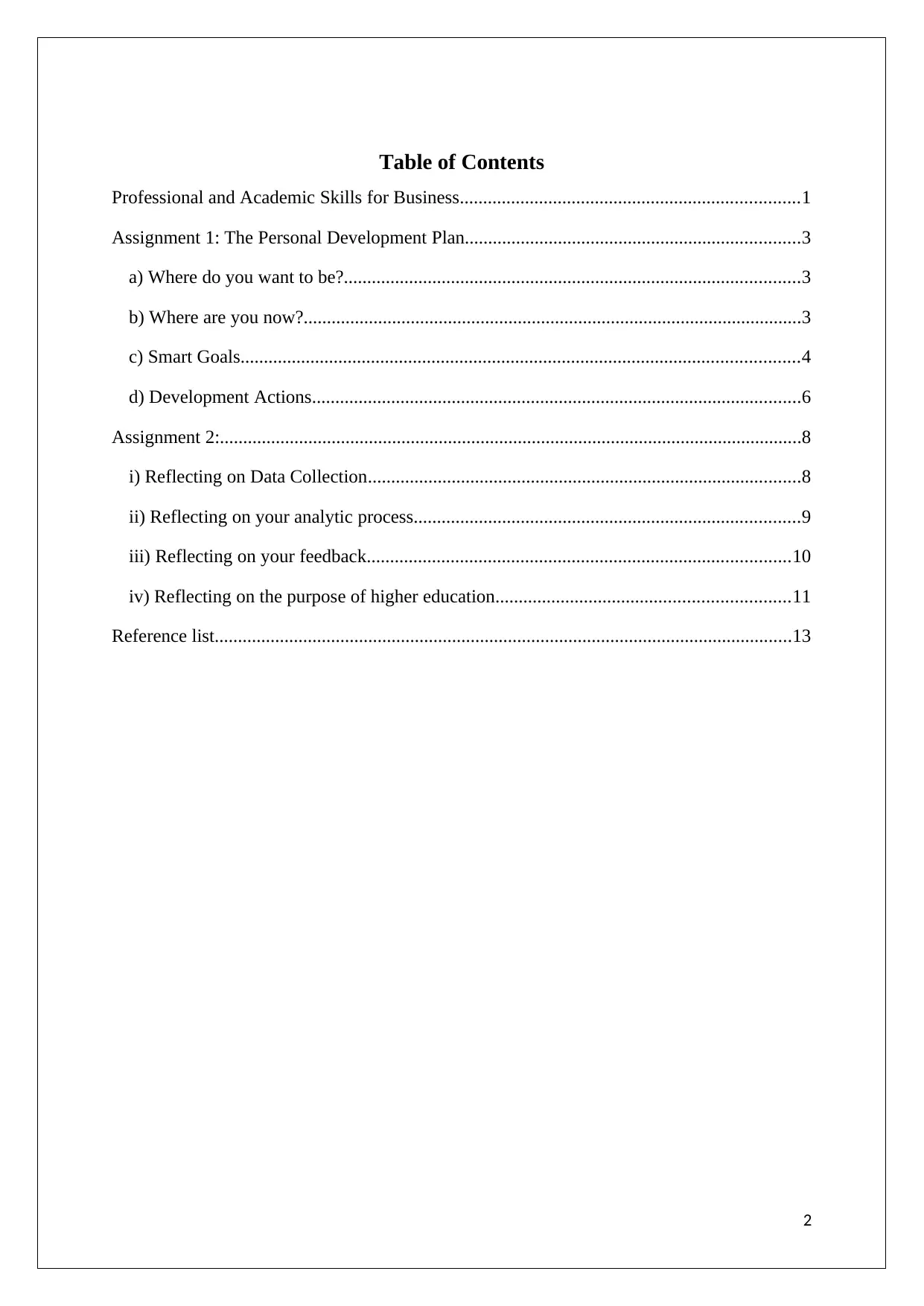
Table of Contents
Professional and Academic Skills for Business.........................................................................1
Assignment 1: The Personal Development Plan........................................................................3
a) Where do you want to be?..................................................................................................3
b) Where are you now?...........................................................................................................3
c) Smart Goals........................................................................................................................4
d) Development Actions.........................................................................................................6
Assignment 2:.............................................................................................................................8
i) Reflecting on Data Collection.............................................................................................8
ii) Reflecting on your analytic process...................................................................................9
iii) Reflecting on your feedback...........................................................................................10
iv) Reflecting on the purpose of higher education...............................................................11
Reference list............................................................................................................................13
2
Professional and Academic Skills for Business.........................................................................1
Assignment 1: The Personal Development Plan........................................................................3
a) Where do you want to be?..................................................................................................3
b) Where are you now?...........................................................................................................3
c) Smart Goals........................................................................................................................4
d) Development Actions.........................................................................................................6
Assignment 2:.............................................................................................................................8
i) Reflecting on Data Collection.............................................................................................8
ii) Reflecting on your analytic process...................................................................................9
iii) Reflecting on your feedback...........................................................................................10
iv) Reflecting on the purpose of higher education...............................................................11
Reference list............................................................................................................................13
2
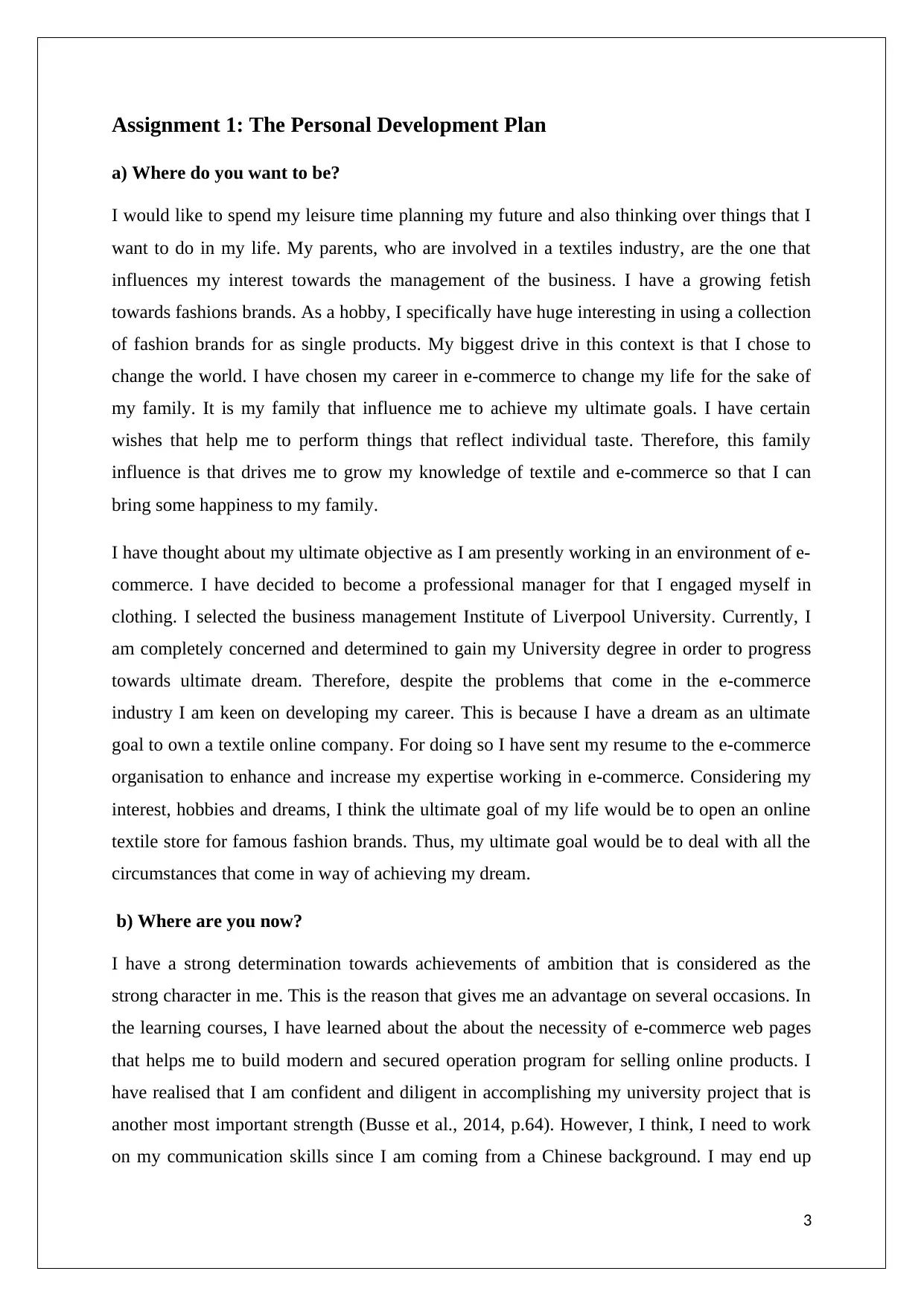
Assignment 1: The Personal Development Plan
a) Where do you want to be?
I would like to spend my leisure time planning my future and also thinking over things that I
want to do in my life. My parents, who are involved in a textiles industry, are the one that
influences my interest towards the management of the business. I have a growing fetish
towards fashions brands. As a hobby, I specifically have huge interesting in using a collection
of fashion brands for as single products. My biggest drive in this context is that I chose to
change the world. I have chosen my career in e-commerce to change my life for the sake of
my family. It is my family that influence me to achieve my ultimate goals. I have certain
wishes that help me to perform things that reflect individual taste. Therefore, this family
influence is that drives me to grow my knowledge of textile and e-commerce so that I can
bring some happiness to my family.
I have thought about my ultimate objective as I am presently working in an environment of e-
commerce. I have decided to become a professional manager for that I engaged myself in
clothing. I selected the business management Institute of Liverpool University. Currently, I
am completely concerned and determined to gain my University degree in order to progress
towards ultimate dream. Therefore, despite the problems that come in the e-commerce
industry I am keen on developing my career. This is because I have a dream as an ultimate
goal to own a textile online company. For doing so I have sent my resume to the e-commerce
organisation to enhance and increase my expertise working in e-commerce. Considering my
interest, hobbies and dreams, I think the ultimate goal of my life would be to open an online
textile store for famous fashion brands. Thus, my ultimate goal would be to deal with all the
circumstances that come in way of achieving my dream.
b) Where are you now?
I have a strong determination towards achievements of ambition that is considered as the
strong character in me. This is the reason that gives me an advantage on several occasions. In
the learning courses, I have learned about the about the necessity of e-commerce web pages
that helps me to build modern and secured operation program for selling online products. I
have realised that I am confident and diligent in accomplishing my university project that is
another most important strength (Busse et al., 2014, p.64). However, I think, I need to work
on my communication skills since I am coming from a Chinese background. I may end up
3
a) Where do you want to be?
I would like to spend my leisure time planning my future and also thinking over things that I
want to do in my life. My parents, who are involved in a textiles industry, are the one that
influences my interest towards the management of the business. I have a growing fetish
towards fashions brands. As a hobby, I specifically have huge interesting in using a collection
of fashion brands for as single products. My biggest drive in this context is that I chose to
change the world. I have chosen my career in e-commerce to change my life for the sake of
my family. It is my family that influence me to achieve my ultimate goals. I have certain
wishes that help me to perform things that reflect individual taste. Therefore, this family
influence is that drives me to grow my knowledge of textile and e-commerce so that I can
bring some happiness to my family.
I have thought about my ultimate objective as I am presently working in an environment of e-
commerce. I have decided to become a professional manager for that I engaged myself in
clothing. I selected the business management Institute of Liverpool University. Currently, I
am completely concerned and determined to gain my University degree in order to progress
towards ultimate dream. Therefore, despite the problems that come in the e-commerce
industry I am keen on developing my career. This is because I have a dream as an ultimate
goal to own a textile online company. For doing so I have sent my resume to the e-commerce
organisation to enhance and increase my expertise working in e-commerce. Considering my
interest, hobbies and dreams, I think the ultimate goal of my life would be to open an online
textile store for famous fashion brands. Thus, my ultimate goal would be to deal with all the
circumstances that come in way of achieving my dream.
b) Where are you now?
I have a strong determination towards achievements of ambition that is considered as the
strong character in me. This is the reason that gives me an advantage on several occasions. In
the learning courses, I have learned about the about the necessity of e-commerce web pages
that helps me to build modern and secured operation program for selling online products. I
have realised that I am confident and diligent in accomplishing my university project that is
another most important strength (Busse et al., 2014, p.64). However, I think, I need to work
on my communication skills since I am coming from a Chinese background. I may end up
3
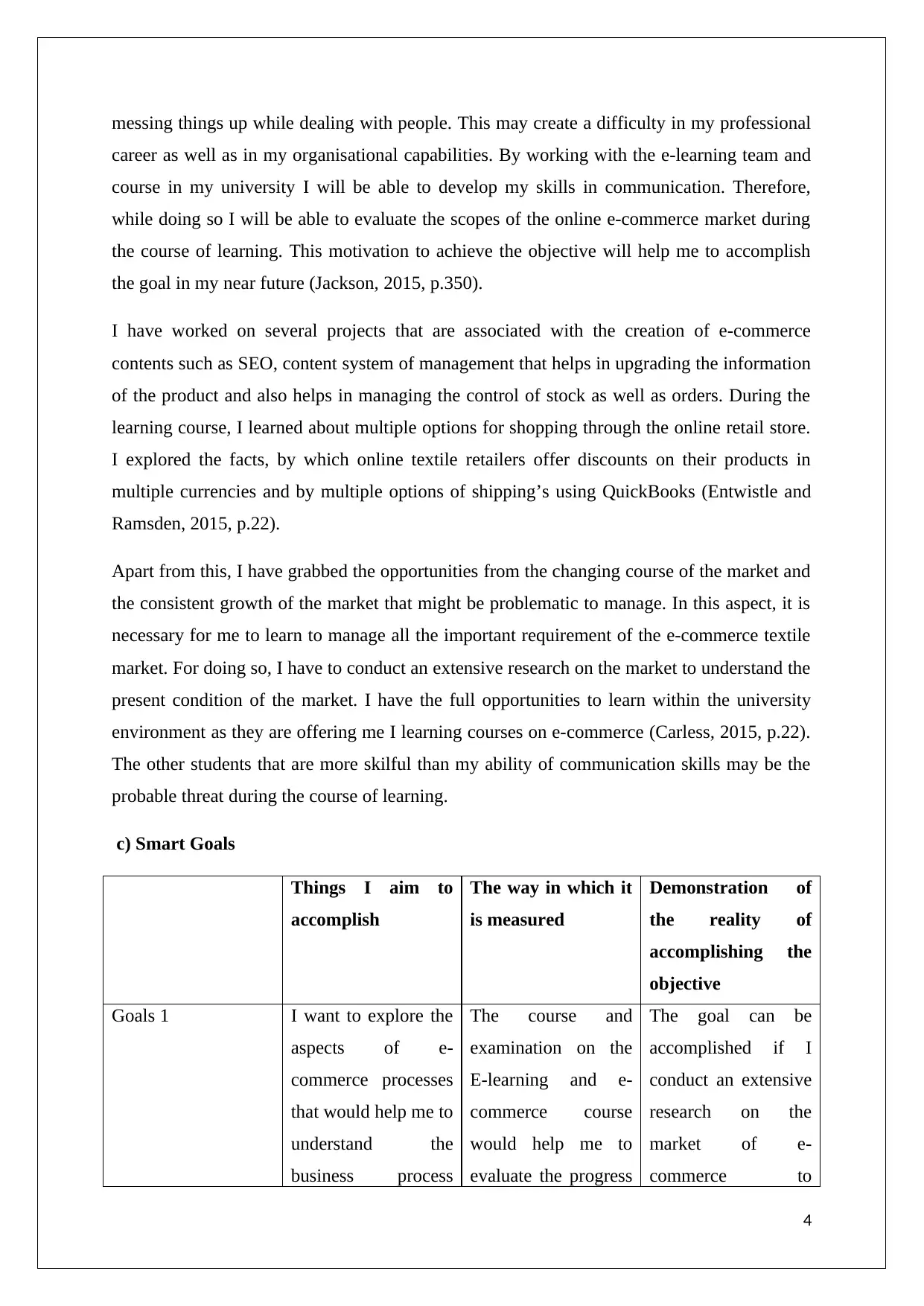
messing things up while dealing with people. This may create a difficulty in my professional
career as well as in my organisational capabilities. By working with the e-learning team and
course in my university I will be able to develop my skills in communication. Therefore,
while doing so I will be able to evaluate the scopes of the online e-commerce market during
the course of learning. This motivation to achieve the objective will help me to accomplish
the goal in my near future (Jackson, 2015, p.350).
I have worked on several projects that are associated with the creation of e-commerce
contents such as SEO, content system of management that helps in upgrading the information
of the product and also helps in managing the control of stock as well as orders. During the
learning course, I learned about multiple options for shopping through the online retail store.
I explored the facts, by which online textile retailers offer discounts on their products in
multiple currencies and by multiple options of shipping’s using QuickBooks (Entwistle and
Ramsden, 2015, p.22).
Apart from this, I have grabbed the opportunities from the changing course of the market and
the consistent growth of the market that might be problematic to manage. In this aspect, it is
necessary for me to learn to manage all the important requirement of the e-commerce textile
market. For doing so, I have to conduct an extensive research on the market to understand the
present condition of the market. I have the full opportunities to learn within the university
environment as they are offering me I learning courses on e-commerce (Carless, 2015, p.22).
The other students that are more skilful than my ability of communication skills may be the
probable threat during the course of learning.
c) Smart Goals
Things I aim to
accomplish
The way in which it
is measured
Demonstration of
the reality of
accomplishing the
objective
Goals 1 I want to explore the
aspects of e-
commerce processes
that would help me to
understand the
business process
The course and
examination on the
E-learning and e-
commerce course
would help me to
evaluate the progress
The goal can be
accomplished if I
conduct an extensive
research on the
market of e-
commerce to
4
career as well as in my organisational capabilities. By working with the e-learning team and
course in my university I will be able to develop my skills in communication. Therefore,
while doing so I will be able to evaluate the scopes of the online e-commerce market during
the course of learning. This motivation to achieve the objective will help me to accomplish
the goal in my near future (Jackson, 2015, p.350).
I have worked on several projects that are associated with the creation of e-commerce
contents such as SEO, content system of management that helps in upgrading the information
of the product and also helps in managing the control of stock as well as orders. During the
learning course, I learned about multiple options for shopping through the online retail store.
I explored the facts, by which online textile retailers offer discounts on their products in
multiple currencies and by multiple options of shipping’s using QuickBooks (Entwistle and
Ramsden, 2015, p.22).
Apart from this, I have grabbed the opportunities from the changing course of the market and
the consistent growth of the market that might be problematic to manage. In this aspect, it is
necessary for me to learn to manage all the important requirement of the e-commerce textile
market. For doing so, I have to conduct an extensive research on the market to understand the
present condition of the market. I have the full opportunities to learn within the university
environment as they are offering me I learning courses on e-commerce (Carless, 2015, p.22).
The other students that are more skilful than my ability of communication skills may be the
probable threat during the course of learning.
c) Smart Goals
Things I aim to
accomplish
The way in which it
is measured
Demonstration of
the reality of
accomplishing the
objective
Goals 1 I want to explore the
aspects of e-
commerce processes
that would help me to
understand the
business process
The course and
examination on the
E-learning and e-
commerce course
would help me to
evaluate the progress
The goal can be
accomplished if I
conduct an extensive
research on the
market of e-
commerce to
4
Secure Best Marks with AI Grader
Need help grading? Try our AI Grader for instant feedback on your assignments.
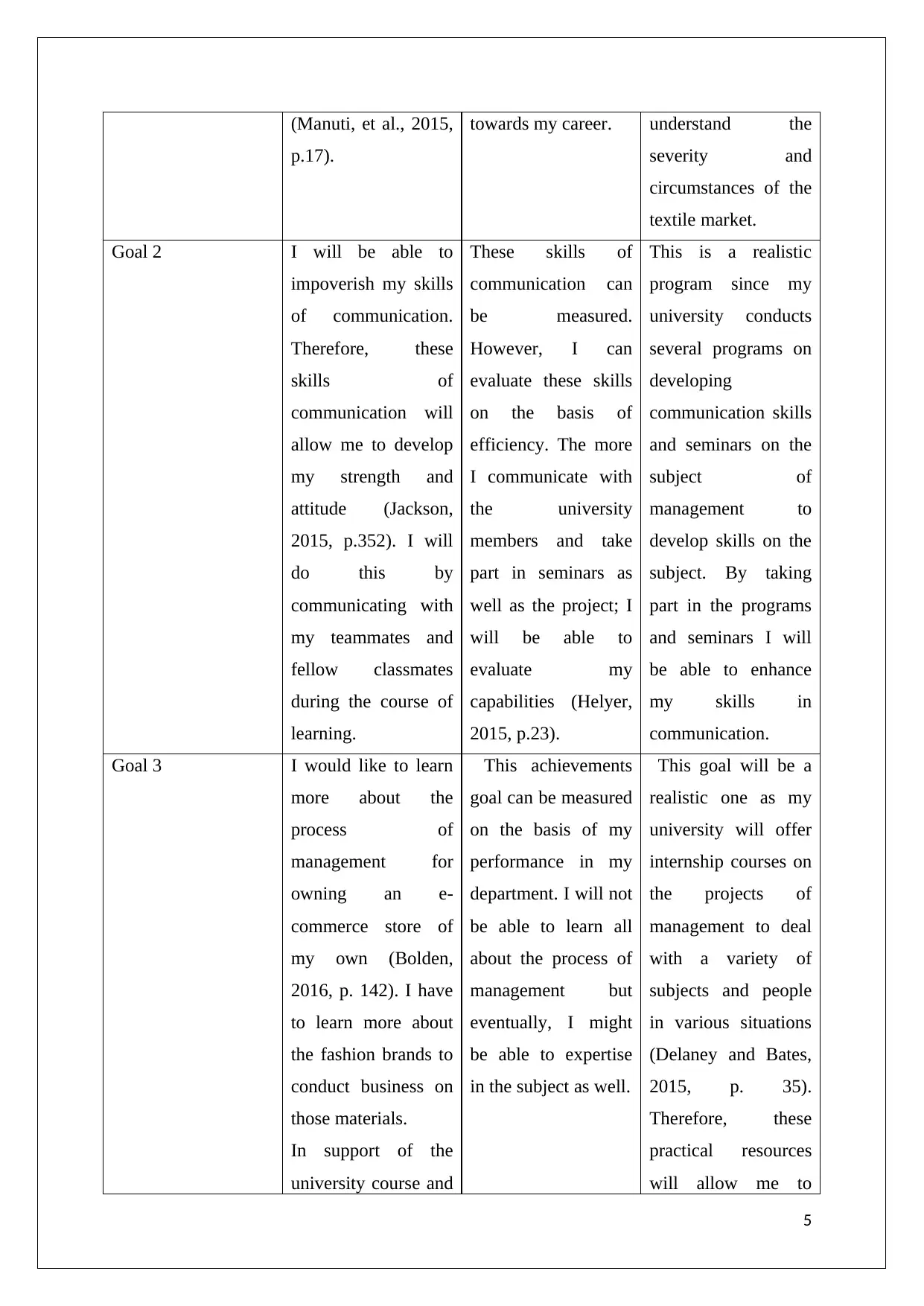
(Manuti, et al., 2015,
p.17).
towards my career. understand the
severity and
circumstances of the
textile market.
Goal 2 I will be able to
impoverish my skills
of communication.
Therefore, these
skills of
communication will
allow me to develop
my strength and
attitude (Jackson,
2015, p.352). I will
do this by
communicating with
my teammates and
fellow classmates
during the course of
learning.
These skills of
communication can
be measured.
However, I can
evaluate these skills
on the basis of
efficiency. The more
I communicate with
the university
members and take
part in seminars as
well as the project; I
will be able to
evaluate my
capabilities (Helyer,
2015, p.23).
This is a realistic
program since my
university conducts
several programs on
developing
communication skills
and seminars on the
subject of
management to
develop skills on the
subject. By taking
part in the programs
and seminars I will
be able to enhance
my skills in
communication.
Goal 3 I would like to learn
more about the
process of
management for
owning an e-
commerce store of
my own (Bolden,
2016, p. 142). I have
to learn more about
the fashion brands to
conduct business on
those materials.
In support of the
university course and
This achievements
goal can be measured
on the basis of my
performance in my
department. I will not
be able to learn all
about the process of
management but
eventually, I might
be able to expertise
in the subject as well.
This goal will be a
realistic one as my
university will offer
internship courses on
the projects of
management to deal
with a variety of
subjects and people
in various situations
(Delaney and Bates,
2015, p. 35).
Therefore, these
practical resources
will allow me to
5
p.17).
towards my career. understand the
severity and
circumstances of the
textile market.
Goal 2 I will be able to
impoverish my skills
of communication.
Therefore, these
skills of
communication will
allow me to develop
my strength and
attitude (Jackson,
2015, p.352). I will
do this by
communicating with
my teammates and
fellow classmates
during the course of
learning.
These skills of
communication can
be measured.
However, I can
evaluate these skills
on the basis of
efficiency. The more
I communicate with
the university
members and take
part in seminars as
well as the project; I
will be able to
evaluate my
capabilities (Helyer,
2015, p.23).
This is a realistic
program since my
university conducts
several programs on
developing
communication skills
and seminars on the
subject of
management to
develop skills on the
subject. By taking
part in the programs
and seminars I will
be able to enhance
my skills in
communication.
Goal 3 I would like to learn
more about the
process of
management for
owning an e-
commerce store of
my own (Bolden,
2016, p. 142). I have
to learn more about
the fashion brands to
conduct business on
those materials.
In support of the
university course and
This achievements
goal can be measured
on the basis of my
performance in my
department. I will not
be able to learn all
about the process of
management but
eventually, I might
be able to expertise
in the subject as well.
This goal will be a
realistic one as my
university will offer
internship courses on
the projects of
management to deal
with a variety of
subjects and people
in various situations
(Delaney and Bates,
2015, p. 35).
Therefore, these
practical resources
will allow me to
5
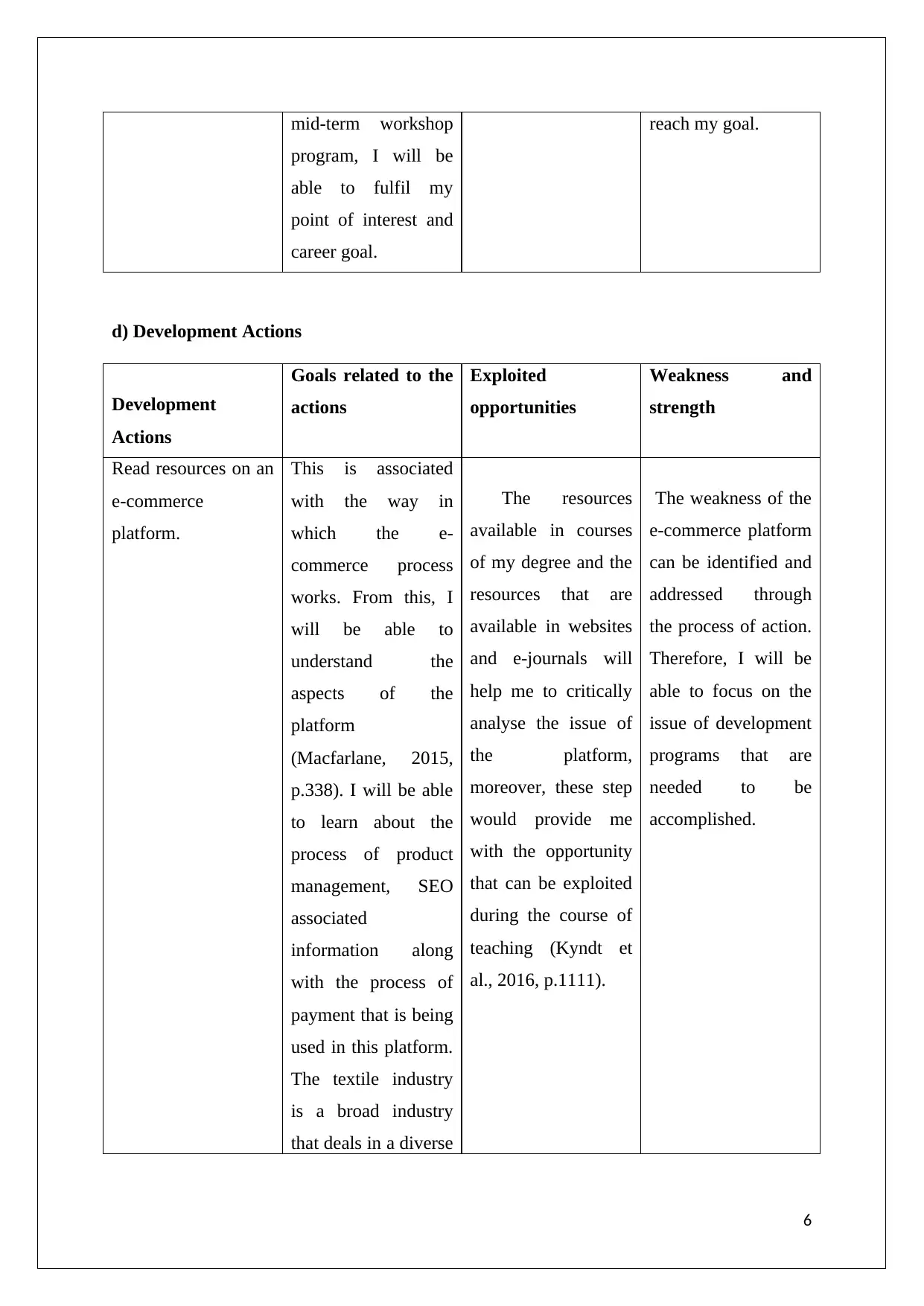
mid-term workshop
program, I will be
able to fulfil my
point of interest and
career goal.
reach my goal.
d) Development Actions
Development
Actions
Goals related to the
actions
Exploited
opportunities
Weakness and
strength
Read resources on an
e-commerce
platform.
This is associated
with the way in
which the e-
commerce process
works. From this, I
will be able to
understand the
aspects of the
platform
(Macfarlane, 2015,
p.338). I will be able
to learn about the
process of product
management, SEO
associated
information along
with the process of
payment that is being
used in this platform.
The textile industry
is a broad industry
that deals in a diverse
The resources
available in courses
of my degree and the
resources that are
available in websites
and e-journals will
help me to critically
analyse the issue of
the platform,
moreover, these step
would provide me
with the opportunity
that can be exploited
during the course of
teaching (Kyndt et
al., 2016, p.1111).
The weakness of the
e-commerce platform
can be identified and
addressed through
the process of action.
Therefore, I will be
able to focus on the
issue of development
programs that are
needed to be
accomplished.
6
program, I will be
able to fulfil my
point of interest and
career goal.
reach my goal.
d) Development Actions
Development
Actions
Goals related to the
actions
Exploited
opportunities
Weakness and
strength
Read resources on an
e-commerce
platform.
This is associated
with the way in
which the e-
commerce process
works. From this, I
will be able to
understand the
aspects of the
platform
(Macfarlane, 2015,
p.338). I will be able
to learn about the
process of product
management, SEO
associated
information along
with the process of
payment that is being
used in this platform.
The textile industry
is a broad industry
that deals in a diverse
The resources
available in courses
of my degree and the
resources that are
available in websites
and e-journals will
help me to critically
analyse the issue of
the platform,
moreover, these step
would provide me
with the opportunity
that can be exploited
during the course of
teaching (Kyndt et
al., 2016, p.1111).
The weakness of the
e-commerce platform
can be identified and
addressed through
the process of action.
Therefore, I will be
able to focus on the
issue of development
programs that are
needed to be
accomplished.
6
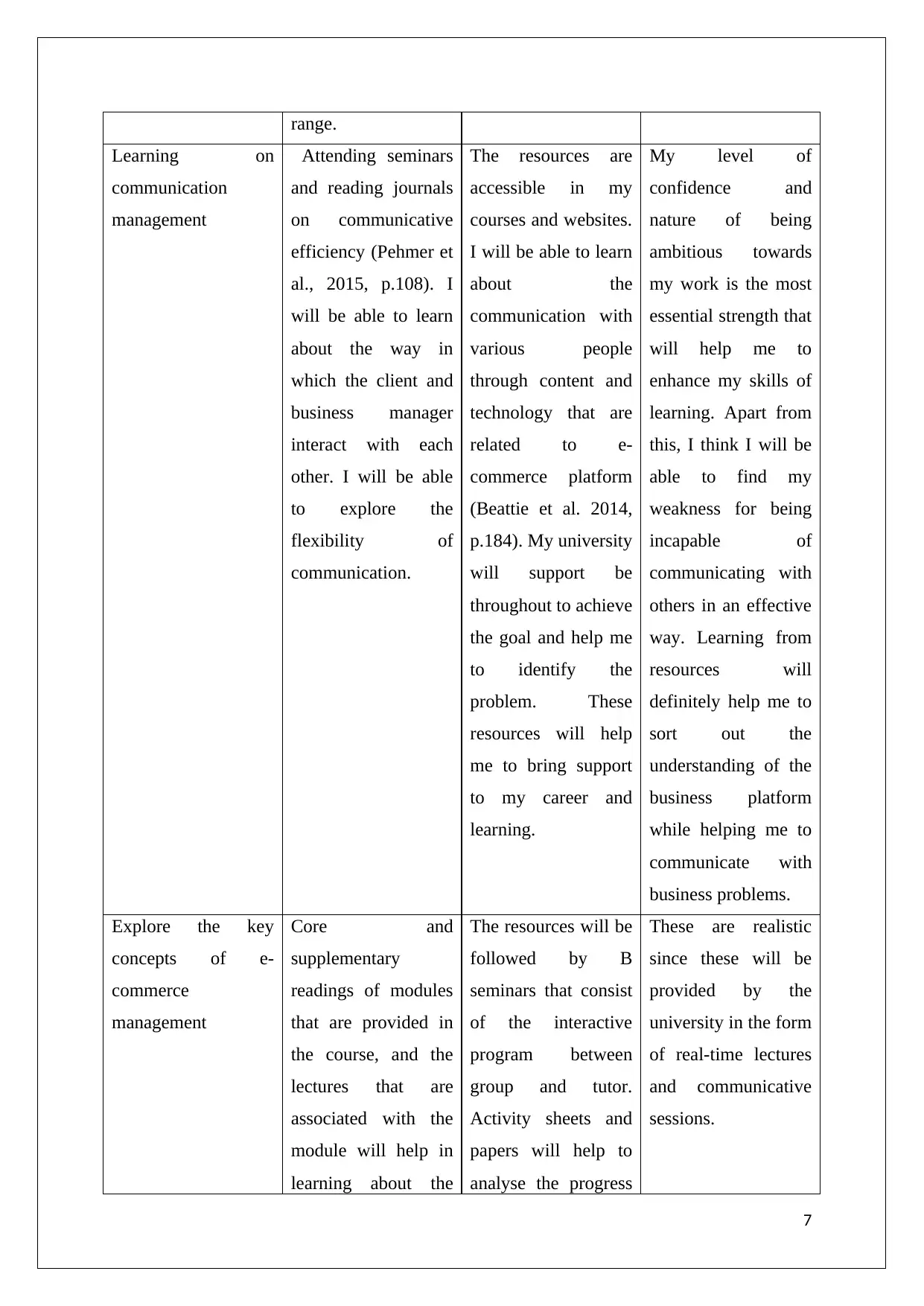
range.
Learning on
communication
management
Attending seminars
and reading journals
on communicative
efficiency (Pehmer et
al., 2015, p.108). I
will be able to learn
about the way in
which the client and
business manager
interact with each
other. I will be able
to explore the
flexibility of
communication.
The resources are
accessible in my
courses and websites.
I will be able to learn
about the
communication with
various people
through content and
technology that are
related to e-
commerce platform
(Beattie et al. 2014,
p.184). My university
will support be
throughout to achieve
the goal and help me
to identify the
problem. These
resources will help
me to bring support
to my career and
learning.
My level of
confidence and
nature of being
ambitious towards
my work is the most
essential strength that
will help me to
enhance my skills of
learning. Apart from
this, I think I will be
able to find my
weakness for being
incapable of
communicating with
others in an effective
way. Learning from
resources will
definitely help me to
sort out the
understanding of the
business platform
while helping me to
communicate with
business problems.
Explore the key
concepts of e-
commerce
management
Core and
supplementary
readings of modules
that are provided in
the course, and the
lectures that are
associated with the
module will help in
learning about the
The resources will be
followed by B
seminars that consist
of the interactive
program between
group and tutor.
Activity sheets and
papers will help to
analyse the progress
These are realistic
since these will be
provided by the
university in the form
of real-time lectures
and communicative
sessions.
7
Learning on
communication
management
Attending seminars
and reading journals
on communicative
efficiency (Pehmer et
al., 2015, p.108). I
will be able to learn
about the way in
which the client and
business manager
interact with each
other. I will be able
to explore the
flexibility of
communication.
The resources are
accessible in my
courses and websites.
I will be able to learn
about the
communication with
various people
through content and
technology that are
related to e-
commerce platform
(Beattie et al. 2014,
p.184). My university
will support be
throughout to achieve
the goal and help me
to identify the
problem. These
resources will help
me to bring support
to my career and
learning.
My level of
confidence and
nature of being
ambitious towards
my work is the most
essential strength that
will help me to
enhance my skills of
learning. Apart from
this, I think I will be
able to find my
weakness for being
incapable of
communicating with
others in an effective
way. Learning from
resources will
definitely help me to
sort out the
understanding of the
business platform
while helping me to
communicate with
business problems.
Explore the key
concepts of e-
commerce
management
Core and
supplementary
readings of modules
that are provided in
the course, and the
lectures that are
associated with the
module will help in
learning about the
The resources will be
followed by B
seminars that consist
of the interactive
program between
group and tutor.
Activity sheets and
papers will help to
analyse the progress
These are realistic
since these will be
provided by the
university in the form
of real-time lectures
and communicative
sessions.
7
Paraphrase This Document
Need a fresh take? Get an instant paraphrase of this document with our AI Paraphraser
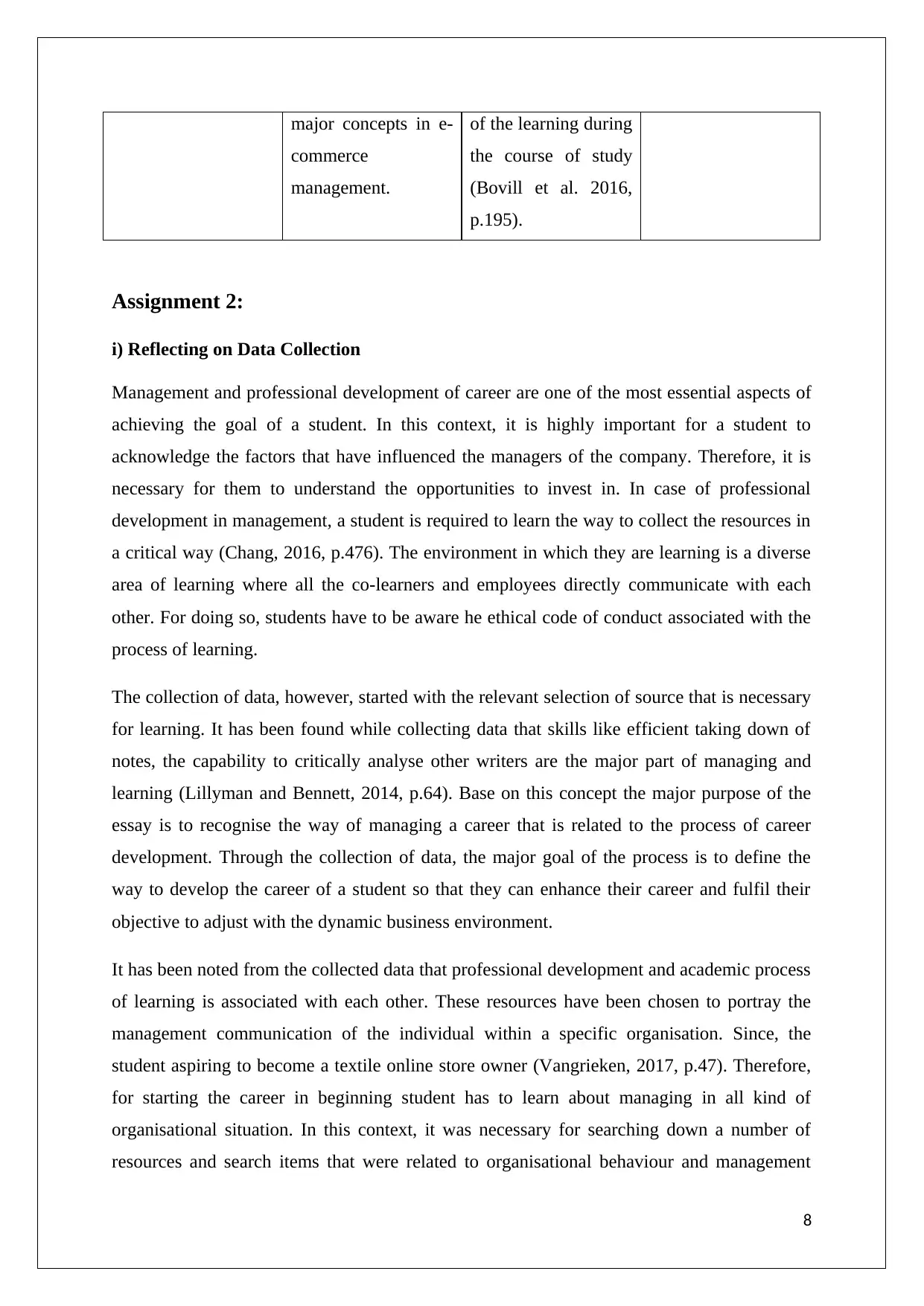
major concepts in e-
commerce
management.
of the learning during
the course of study
(Bovill et al. 2016,
p.195).
Assignment 2:
i) Reflecting on Data Collection
Management and professional development of career are one of the most essential aspects of
achieving the goal of a student. In this context, it is highly important for a student to
acknowledge the factors that have influenced the managers of the company. Therefore, it is
necessary for them to understand the opportunities to invest in. In case of professional
development in management, a student is required to learn the way to collect the resources in
a critical way (Chang, 2016, p.476). The environment in which they are learning is a diverse
area of learning where all the co-learners and employees directly communicate with each
other. For doing so, students have to be aware he ethical code of conduct associated with the
process of learning.
The collection of data, however, started with the relevant selection of source that is necessary
for learning. It has been found while collecting data that skills like efficient taking down of
notes, the capability to critically analyse other writers are the major part of managing and
learning (Lillyman and Bennett, 2014, p.64). Base on this concept the major purpose of the
essay is to recognise the way of managing a career that is related to the process of career
development. Through the collection of data, the major goal of the process is to define the
way to develop the career of a student so that they can enhance their career and fulfil their
objective to adjust with the dynamic business environment.
It has been noted from the collected data that professional development and academic process
of learning is associated with each other. These resources have been chosen to portray the
management communication of the individual within a specific organisation. Since, the
student aspiring to become a textile online store owner (Vangrieken, 2017, p.47). Therefore,
for starting the career in beginning student has to learn about managing in all kind of
organisational situation. In this context, it was necessary for searching down a number of
resources and search items that were related to organisational behaviour and management
8
commerce
management.
of the learning during
the course of study
(Bovill et al. 2016,
p.195).
Assignment 2:
i) Reflecting on Data Collection
Management and professional development of career are one of the most essential aspects of
achieving the goal of a student. In this context, it is highly important for a student to
acknowledge the factors that have influenced the managers of the company. Therefore, it is
necessary for them to understand the opportunities to invest in. In case of professional
development in management, a student is required to learn the way to collect the resources in
a critical way (Chang, 2016, p.476). The environment in which they are learning is a diverse
area of learning where all the co-learners and employees directly communicate with each
other. For doing so, students have to be aware he ethical code of conduct associated with the
process of learning.
The collection of data, however, started with the relevant selection of source that is necessary
for learning. It has been found while collecting data that skills like efficient taking down of
notes, the capability to critically analyse other writers are the major part of managing and
learning (Lillyman and Bennett, 2014, p.64). Base on this concept the major purpose of the
essay is to recognise the way of managing a career that is related to the process of career
development. Through the collection of data, the major goal of the process is to define the
way to develop the career of a student so that they can enhance their career and fulfil their
objective to adjust with the dynamic business environment.
It has been noted from the collected data that professional development and academic process
of learning is associated with each other. These resources have been chosen to portray the
management communication of the individual within a specific organisation. Since, the
student aspiring to become a textile online store owner (Vangrieken, 2017, p.47). Therefore,
for starting the career in beginning student has to learn about managing in all kind of
organisational situation. In this context, it was necessary for searching down a number of
resources and search items that were related to organisational behaviour and management
8
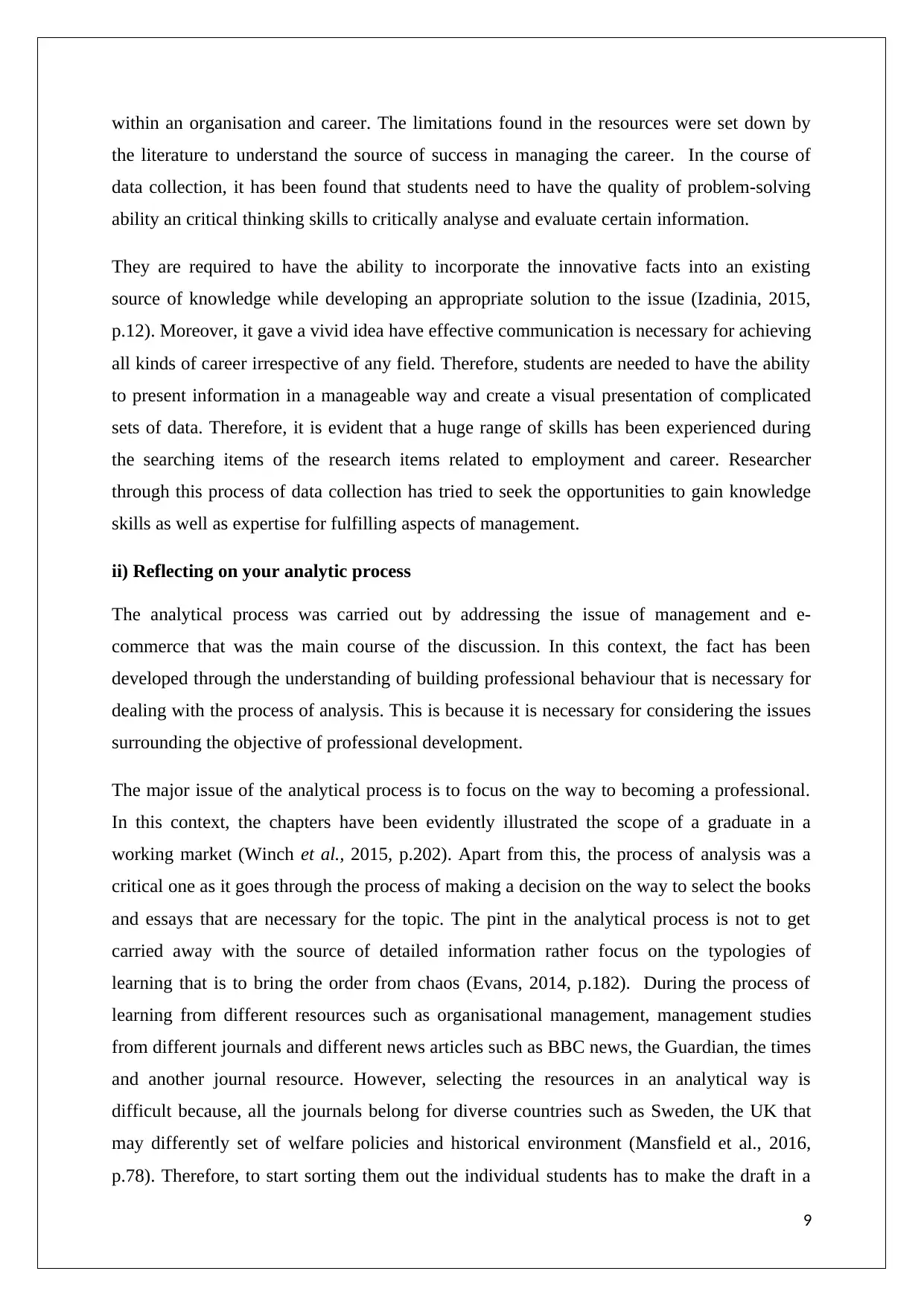
within an organisation and career. The limitations found in the resources were set down by
the literature to understand the source of success in managing the career. In the course of
data collection, it has been found that students need to have the quality of problem-solving
ability an critical thinking skills to critically analyse and evaluate certain information.
They are required to have the ability to incorporate the innovative facts into an existing
source of knowledge while developing an appropriate solution to the issue (Izadinia, 2015,
p.12). Moreover, it gave a vivid idea have effective communication is necessary for achieving
all kinds of career irrespective of any field. Therefore, students are needed to have the ability
to present information in a manageable way and create a visual presentation of complicated
sets of data. Therefore, it is evident that a huge range of skills has been experienced during
the searching items of the research items related to employment and career. Researcher
through this process of data collection has tried to seek the opportunities to gain knowledge
skills as well as expertise for fulfilling aspects of management.
ii) Reflecting on your analytic process
The analytical process was carried out by addressing the issue of management and e-
commerce that was the main course of the discussion. In this context, the fact has been
developed through the understanding of building professional behaviour that is necessary for
dealing with the process of analysis. This is because it is necessary for considering the issues
surrounding the objective of professional development.
The major issue of the analytical process is to focus on the way to becoming a professional.
In this context, the chapters have been evidently illustrated the scope of a graduate in a
working market (Winch et al., 2015, p.202). Apart from this, the process of analysis was a
critical one as it goes through the process of making a decision on the way to select the books
and essays that are necessary for the topic. The pint in the analytical process is not to get
carried away with the source of detailed information rather focus on the typologies of
learning that is to bring the order from chaos (Evans, 2014, p.182). During the process of
learning from different resources such as organisational management, management studies
from different journals and different news articles such as BBC news, the Guardian, the times
and another journal resource. However, selecting the resources in an analytical way is
difficult because, all the journals belong for diverse countries such as Sweden, the UK that
may differently set of welfare policies and historical environment (Mansfield et al., 2016,
p.78). Therefore, to start sorting them out the individual students has to make the draft in a
9
the literature to understand the source of success in managing the career. In the course of
data collection, it has been found that students need to have the quality of problem-solving
ability an critical thinking skills to critically analyse and evaluate certain information.
They are required to have the ability to incorporate the innovative facts into an existing
source of knowledge while developing an appropriate solution to the issue (Izadinia, 2015,
p.12). Moreover, it gave a vivid idea have effective communication is necessary for achieving
all kinds of career irrespective of any field. Therefore, students are needed to have the ability
to present information in a manageable way and create a visual presentation of complicated
sets of data. Therefore, it is evident that a huge range of skills has been experienced during
the searching items of the research items related to employment and career. Researcher
through this process of data collection has tried to seek the opportunities to gain knowledge
skills as well as expertise for fulfilling aspects of management.
ii) Reflecting on your analytic process
The analytical process was carried out by addressing the issue of management and e-
commerce that was the main course of the discussion. In this context, the fact has been
developed through the understanding of building professional behaviour that is necessary for
dealing with the process of analysis. This is because it is necessary for considering the issues
surrounding the objective of professional development.
The major issue of the analytical process is to focus on the way to becoming a professional.
In this context, the chapters have been evidently illustrated the scope of a graduate in a
working market (Winch et al., 2015, p.202). Apart from this, the process of analysis was a
critical one as it goes through the process of making a decision on the way to select the books
and essays that are necessary for the topic. The pint in the analytical process is not to get
carried away with the source of detailed information rather focus on the typologies of
learning that is to bring the order from chaos (Evans, 2014, p.182). During the process of
learning from different resources such as organisational management, management studies
from different journals and different news articles such as BBC news, the Guardian, the times
and another journal resource. However, selecting the resources in an analytical way is
difficult because, all the journals belong for diverse countries such as Sweden, the UK that
may differently set of welfare policies and historical environment (Mansfield et al., 2016,
p.78). Therefore, to start sorting them out the individual students has to make the draft in a
9
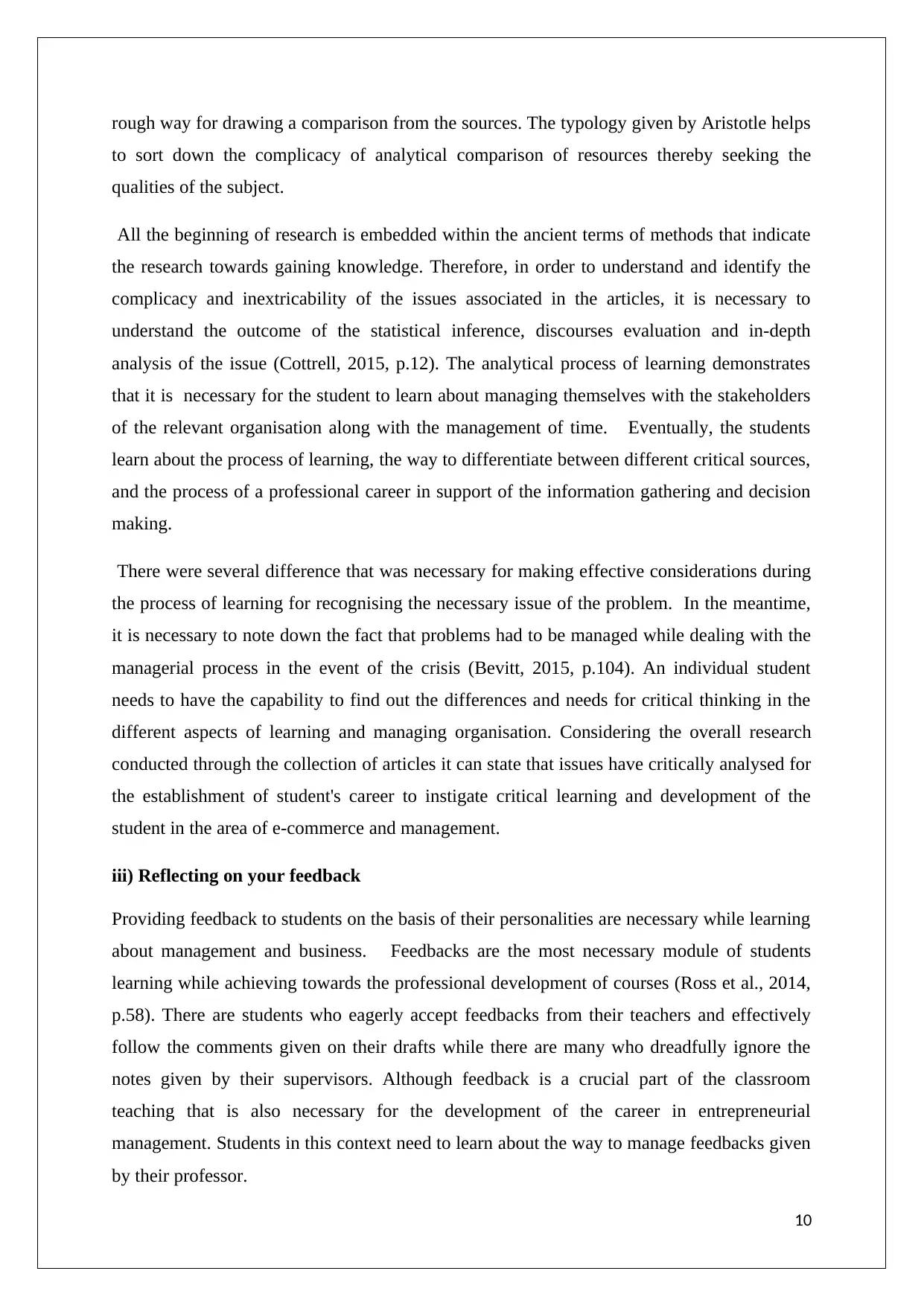
rough way for drawing a comparison from the sources. The typology given by Aristotle helps
to sort down the complicacy of analytical comparison of resources thereby seeking the
qualities of the subject.
All the beginning of research is embedded within the ancient terms of methods that indicate
the research towards gaining knowledge. Therefore, in order to understand and identify the
complicacy and inextricability of the issues associated in the articles, it is necessary to
understand the outcome of the statistical inference, discourses evaluation and in-depth
analysis of the issue (Cottrell, 2015, p.12). The analytical process of learning demonstrates
that it is necessary for the student to learn about managing themselves with the stakeholders
of the relevant organisation along with the management of time. Eventually, the students
learn about the process of learning, the way to differentiate between different critical sources,
and the process of a professional career in support of the information gathering and decision
making.
There were several difference that was necessary for making effective considerations during
the process of learning for recognising the necessary issue of the problem. In the meantime,
it is necessary to note down the fact that problems had to be managed while dealing with the
managerial process in the event of the crisis (Bevitt, 2015, p.104). An individual student
needs to have the capability to find out the differences and needs for critical thinking in the
different aspects of learning and managing organisation. Considering the overall research
conducted through the collection of articles it can state that issues have critically analysed for
the establishment of student's career to instigate critical learning and development of the
student in the area of e-commerce and management.
iii) Reflecting on your feedback
Providing feedback to students on the basis of their personalities are necessary while learning
about management and business. Feedbacks are the most necessary module of students
learning while achieving towards the professional development of courses (Ross et al., 2014,
p.58). There are students who eagerly accept feedbacks from their teachers and effectively
follow the comments given on their drafts while there are many who dreadfully ignore the
notes given by their supervisors. Although feedback is a crucial part of the classroom
teaching that is also necessary for the development of the career in entrepreneurial
management. Students in this context need to learn about the way to manage feedbacks given
by their professor.
10
to sort down the complicacy of analytical comparison of resources thereby seeking the
qualities of the subject.
All the beginning of research is embedded within the ancient terms of methods that indicate
the research towards gaining knowledge. Therefore, in order to understand and identify the
complicacy and inextricability of the issues associated in the articles, it is necessary to
understand the outcome of the statistical inference, discourses evaluation and in-depth
analysis of the issue (Cottrell, 2015, p.12). The analytical process of learning demonstrates
that it is necessary for the student to learn about managing themselves with the stakeholders
of the relevant organisation along with the management of time. Eventually, the students
learn about the process of learning, the way to differentiate between different critical sources,
and the process of a professional career in support of the information gathering and decision
making.
There were several difference that was necessary for making effective considerations during
the process of learning for recognising the necessary issue of the problem. In the meantime,
it is necessary to note down the fact that problems had to be managed while dealing with the
managerial process in the event of the crisis (Bevitt, 2015, p.104). An individual student
needs to have the capability to find out the differences and needs for critical thinking in the
different aspects of learning and managing organisation. Considering the overall research
conducted through the collection of articles it can state that issues have critically analysed for
the establishment of student's career to instigate critical learning and development of the
student in the area of e-commerce and management.
iii) Reflecting on your feedback
Providing feedback to students on the basis of their personalities are necessary while learning
about management and business. Feedbacks are the most necessary module of students
learning while achieving towards the professional development of courses (Ross et al., 2014,
p.58). There are students who eagerly accept feedbacks from their teachers and effectively
follow the comments given on their drafts while there are many who dreadfully ignore the
notes given by their supervisors. Although feedback is a crucial part of the classroom
teaching that is also necessary for the development of the career in entrepreneurial
management. Students in this context need to learn about the way to manage feedbacks given
by their professor.
10
Secure Best Marks with AI Grader
Need help grading? Try our AI Grader for instant feedback on your assignments.
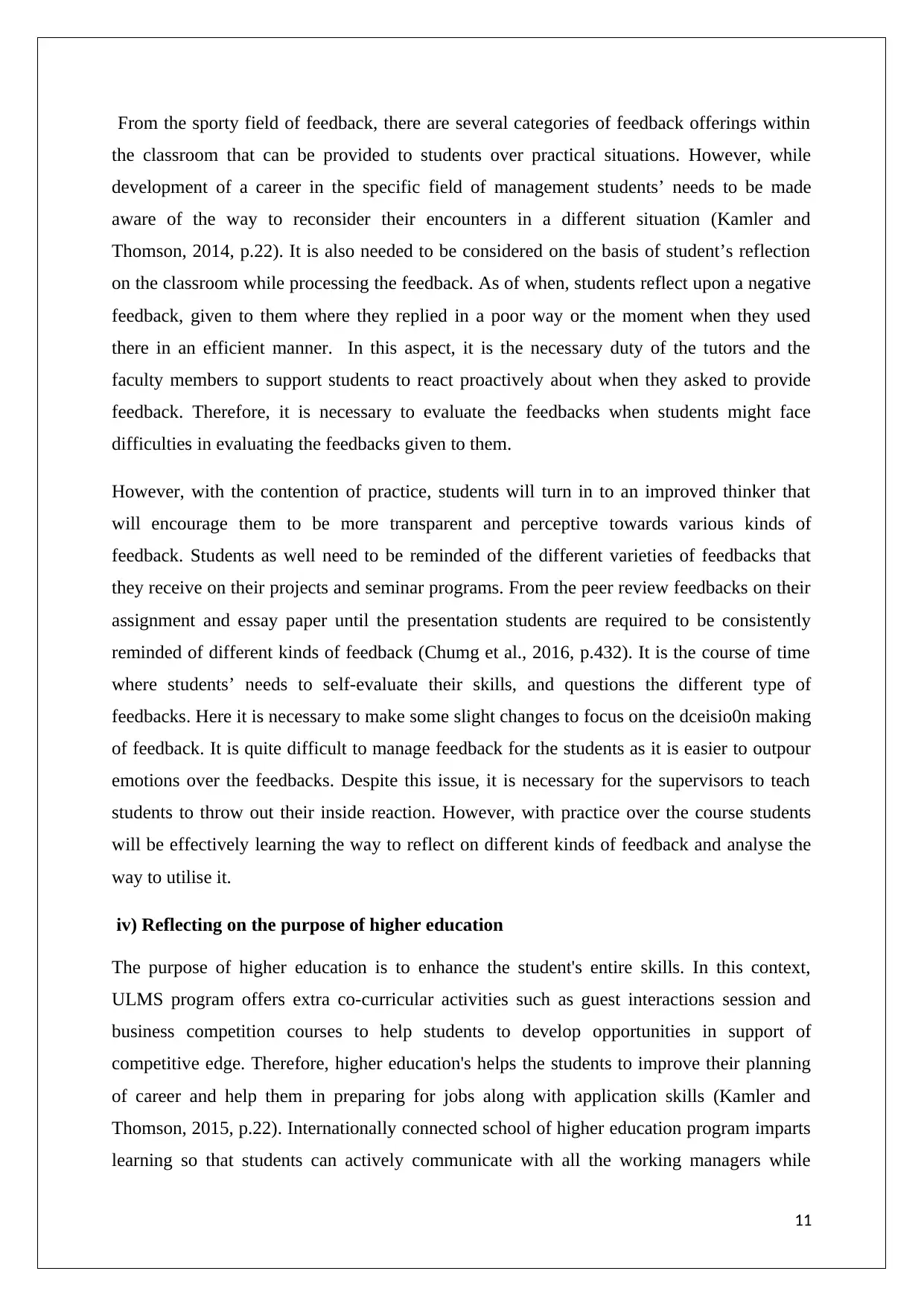
From the sporty field of feedback, there are several categories of feedback offerings within
the classroom that can be provided to students over practical situations. However, while
development of a career in the specific field of management students’ needs to be made
aware of the way to reconsider their encounters in a different situation (Kamler and
Thomson, 2014, p.22). It is also needed to be considered on the basis of student’s reflection
on the classroom while processing the feedback. As of when, students reflect upon a negative
feedback, given to them where they replied in a poor way or the moment when they used
there in an efficient manner. In this aspect, it is the necessary duty of the tutors and the
faculty members to support students to react proactively about when they asked to provide
feedback. Therefore, it is necessary to evaluate the feedbacks when students might face
difficulties in evaluating the feedbacks given to them.
However, with the contention of practice, students will turn in to an improved thinker that
will encourage them to be more transparent and perceptive towards various kinds of
feedback. Students as well need to be reminded of the different varieties of feedbacks that
they receive on their projects and seminar programs. From the peer review feedbacks on their
assignment and essay paper until the presentation students are required to be consistently
reminded of different kinds of feedback (Chumg et al., 2016, p.432). It is the course of time
where students’ needs to self-evaluate their skills, and questions the different type of
feedbacks. Here it is necessary to make some slight changes to focus on the dceisio0n making
of feedback. It is quite difficult to manage feedback for the students as it is easier to outpour
emotions over the feedbacks. Despite this issue, it is necessary for the supervisors to teach
students to throw out their inside reaction. However, with practice over the course students
will be effectively learning the way to reflect on different kinds of feedback and analyse the
way to utilise it.
iv) Reflecting on the purpose of higher education
The purpose of higher education is to enhance the student's entire skills. In this context,
ULMS program offers extra co-curricular activities such as guest interactions session and
business competition courses to help students to develop opportunities in support of
competitive edge. Therefore, higher education's helps the students to improve their planning
of career and help them in preparing for jobs along with application skills (Kamler and
Thomson, 2015, p.22). Internationally connected school of higher education program imparts
learning so that students can actively communicate with all the working managers while
11
the classroom that can be provided to students over practical situations. However, while
development of a career in the specific field of management students’ needs to be made
aware of the way to reconsider their encounters in a different situation (Kamler and
Thomson, 2014, p.22). It is also needed to be considered on the basis of student’s reflection
on the classroom while processing the feedback. As of when, students reflect upon a negative
feedback, given to them where they replied in a poor way or the moment when they used
there in an efficient manner. In this aspect, it is the necessary duty of the tutors and the
faculty members to support students to react proactively about when they asked to provide
feedback. Therefore, it is necessary to evaluate the feedbacks when students might face
difficulties in evaluating the feedbacks given to them.
However, with the contention of practice, students will turn in to an improved thinker that
will encourage them to be more transparent and perceptive towards various kinds of
feedback. Students as well need to be reminded of the different varieties of feedbacks that
they receive on their projects and seminar programs. From the peer review feedbacks on their
assignment and essay paper until the presentation students are required to be consistently
reminded of different kinds of feedback (Chumg et al., 2016, p.432). It is the course of time
where students’ needs to self-evaluate their skills, and questions the different type of
feedbacks. Here it is necessary to make some slight changes to focus on the dceisio0n making
of feedback. It is quite difficult to manage feedback for the students as it is easier to outpour
emotions over the feedbacks. Despite this issue, it is necessary for the supervisors to teach
students to throw out their inside reaction. However, with practice over the course students
will be effectively learning the way to reflect on different kinds of feedback and analyse the
way to utilise it.
iv) Reflecting on the purpose of higher education
The purpose of higher education is to enhance the student's entire skills. In this context,
ULMS program offers extra co-curricular activities such as guest interactions session and
business competition courses to help students to develop opportunities in support of
competitive edge. Therefore, higher education's helps the students to improve their planning
of career and help them in preparing for jobs along with application skills (Kamler and
Thomson, 2015, p.22). Internationally connected school of higher education program imparts
learning so that students can actively communicate with all the working managers while
11
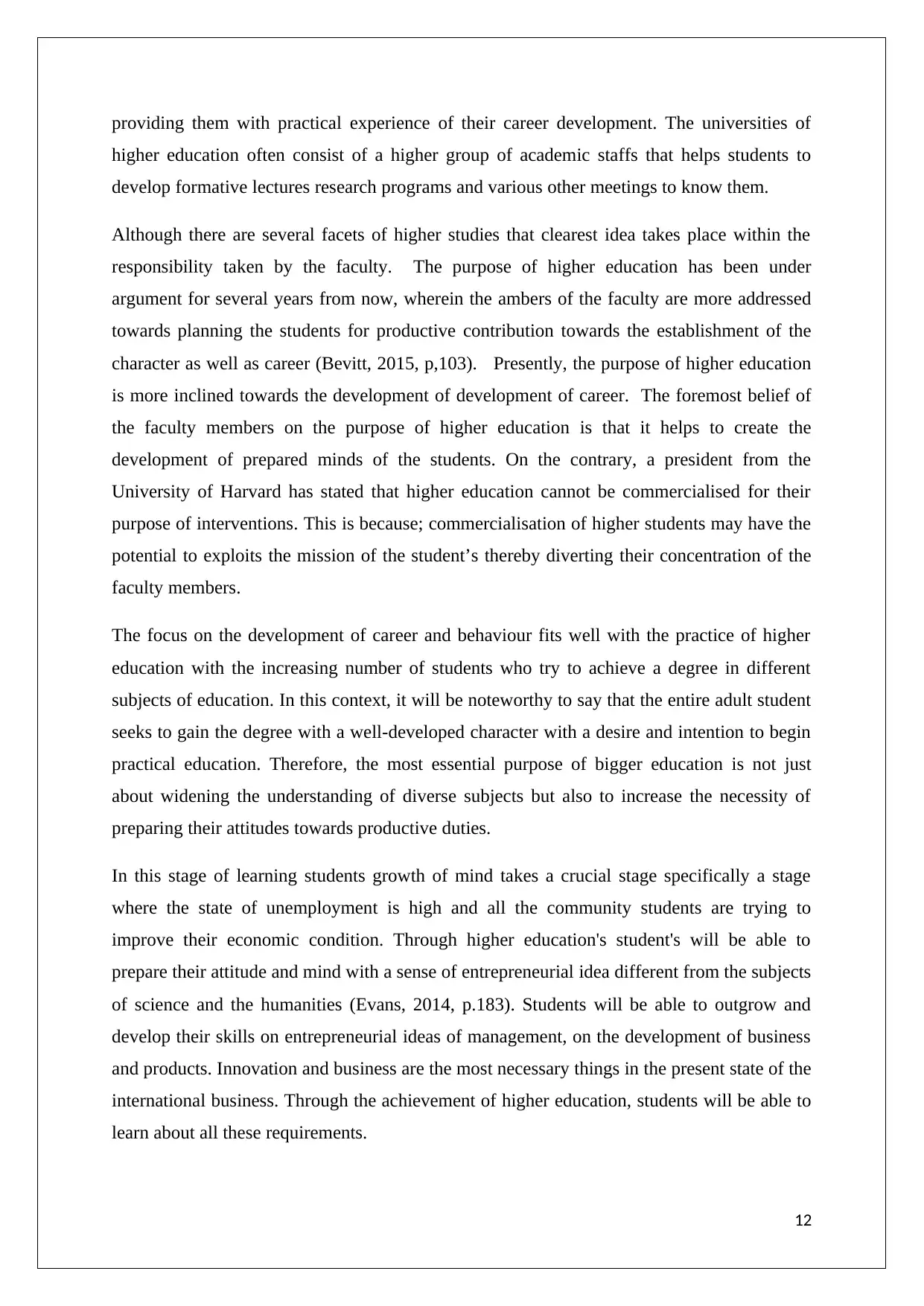
providing them with practical experience of their career development. The universities of
higher education often consist of a higher group of academic staffs that helps students to
develop formative lectures research programs and various other meetings to know them.
Although there are several facets of higher studies that clearest idea takes place within the
responsibility taken by the faculty. The purpose of higher education has been under
argument for several years from now, wherein the ambers of the faculty are more addressed
towards planning the students for productive contribution towards the establishment of the
character as well as career (Bevitt, 2015, p,103). Presently, the purpose of higher education
is more inclined towards the development of development of career. The foremost belief of
the faculty members on the purpose of higher education is that it helps to create the
development of prepared minds of the students. On the contrary, a president from the
University of Harvard has stated that higher education cannot be commercialised for their
purpose of interventions. This is because; commercialisation of higher students may have the
potential to exploits the mission of the student’s thereby diverting their concentration of the
faculty members.
The focus on the development of career and behaviour fits well with the practice of higher
education with the increasing number of students who try to achieve a degree in different
subjects of education. In this context, it will be noteworthy to say that the entire adult student
seeks to gain the degree with a well-developed character with a desire and intention to begin
practical education. Therefore, the most essential purpose of bigger education is not just
about widening the understanding of diverse subjects but also to increase the necessity of
preparing their attitudes towards productive duties.
In this stage of learning students growth of mind takes a crucial stage specifically a stage
where the state of unemployment is high and all the community students are trying to
improve their economic condition. Through higher education's student's will be able to
prepare their attitude and mind with a sense of entrepreneurial idea different from the subjects
of science and the humanities (Evans, 2014, p.183). Students will be able to outgrow and
develop their skills on entrepreneurial ideas of management, on the development of business
and products. Innovation and business are the most necessary things in the present state of the
international business. Through the achievement of higher education, students will be able to
learn about all these requirements.
12
higher education often consist of a higher group of academic staffs that helps students to
develop formative lectures research programs and various other meetings to know them.
Although there are several facets of higher studies that clearest idea takes place within the
responsibility taken by the faculty. The purpose of higher education has been under
argument for several years from now, wherein the ambers of the faculty are more addressed
towards planning the students for productive contribution towards the establishment of the
character as well as career (Bevitt, 2015, p,103). Presently, the purpose of higher education
is more inclined towards the development of development of career. The foremost belief of
the faculty members on the purpose of higher education is that it helps to create the
development of prepared minds of the students. On the contrary, a president from the
University of Harvard has stated that higher education cannot be commercialised for their
purpose of interventions. This is because; commercialisation of higher students may have the
potential to exploits the mission of the student’s thereby diverting their concentration of the
faculty members.
The focus on the development of career and behaviour fits well with the practice of higher
education with the increasing number of students who try to achieve a degree in different
subjects of education. In this context, it will be noteworthy to say that the entire adult student
seeks to gain the degree with a well-developed character with a desire and intention to begin
practical education. Therefore, the most essential purpose of bigger education is not just
about widening the understanding of diverse subjects but also to increase the necessity of
preparing their attitudes towards productive duties.
In this stage of learning students growth of mind takes a crucial stage specifically a stage
where the state of unemployment is high and all the community students are trying to
improve their economic condition. Through higher education's student's will be able to
prepare their attitude and mind with a sense of entrepreneurial idea different from the subjects
of science and the humanities (Evans, 2014, p.183). Students will be able to outgrow and
develop their skills on entrepreneurial ideas of management, on the development of business
and products. Innovation and business are the most necessary things in the present state of the
international business. Through the achievement of higher education, students will be able to
learn about all these requirements.
12
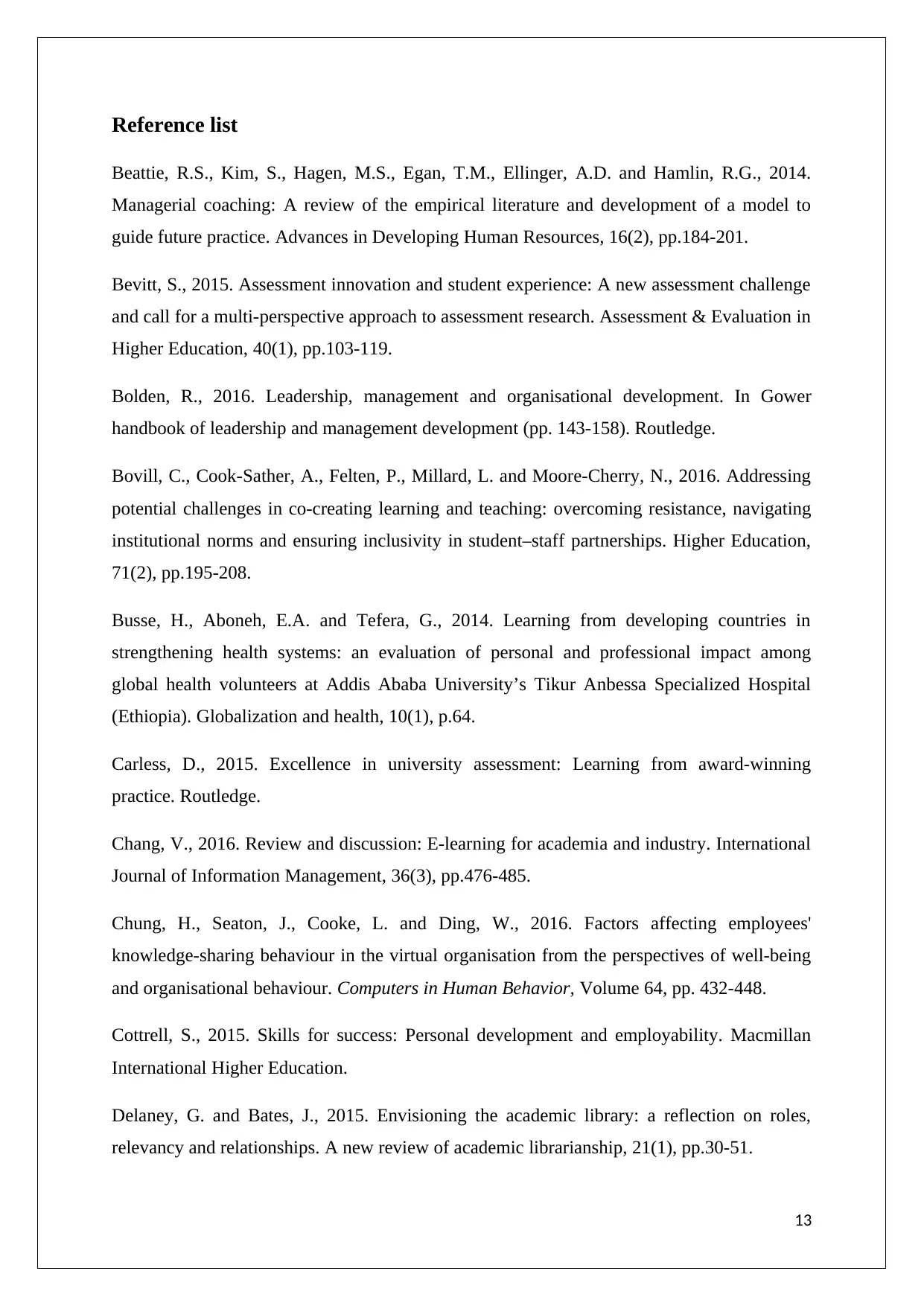
Reference list
Beattie, R.S., Kim, S., Hagen, M.S., Egan, T.M., Ellinger, A.D. and Hamlin, R.G., 2014.
Managerial coaching: A review of the empirical literature and development of a model to
guide future practice. Advances in Developing Human Resources, 16(2), pp.184-201.
Bevitt, S., 2015. Assessment innovation and student experience: A new assessment challenge
and call for a multi-perspective approach to assessment research. Assessment & Evaluation in
Higher Education, 40(1), pp.103-119.
Bolden, R., 2016. Leadership, management and organisational development. In Gower
handbook of leadership and management development (pp. 143-158). Routledge.
Bovill, C., Cook-Sather, A., Felten, P., Millard, L. and Moore-Cherry, N., 2016. Addressing
potential challenges in co-creating learning and teaching: overcoming resistance, navigating
institutional norms and ensuring inclusivity in student–staff partnerships. Higher Education,
71(2), pp.195-208.
Busse, H., Aboneh, E.A. and Tefera, G., 2014. Learning from developing countries in
strengthening health systems: an evaluation of personal and professional impact among
global health volunteers at Addis Ababa University’s Tikur Anbessa Specialized Hospital
(Ethiopia). Globalization and health, 10(1), p.64.
Carless, D., 2015. Excellence in university assessment: Learning from award-winning
practice. Routledge.
Chang, V., 2016. Review and discussion: E-learning for academia and industry. International
Journal of Information Management, 36(3), pp.476-485.
Chung, H., Seaton, J., Cooke, L. and Ding, W., 2016. Factors affecting employees'
knowledge-sharing behaviour in the virtual organisation from the perspectives of well-being
and organisational behaviour. Computers in Human Behavior, Volume 64, pp. 432-448.
Cottrell, S., 2015. Skills for success: Personal development and employability. Macmillan
International Higher Education.
Delaney, G. and Bates, J., 2015. Envisioning the academic library: a reflection on roles,
relevancy and relationships. A new review of academic librarianship, 21(1), pp.30-51.
13
Beattie, R.S., Kim, S., Hagen, M.S., Egan, T.M., Ellinger, A.D. and Hamlin, R.G., 2014.
Managerial coaching: A review of the empirical literature and development of a model to
guide future practice. Advances in Developing Human Resources, 16(2), pp.184-201.
Bevitt, S., 2015. Assessment innovation and student experience: A new assessment challenge
and call for a multi-perspective approach to assessment research. Assessment & Evaluation in
Higher Education, 40(1), pp.103-119.
Bolden, R., 2016. Leadership, management and organisational development. In Gower
handbook of leadership and management development (pp. 143-158). Routledge.
Bovill, C., Cook-Sather, A., Felten, P., Millard, L. and Moore-Cherry, N., 2016. Addressing
potential challenges in co-creating learning and teaching: overcoming resistance, navigating
institutional norms and ensuring inclusivity in student–staff partnerships. Higher Education,
71(2), pp.195-208.
Busse, H., Aboneh, E.A. and Tefera, G., 2014. Learning from developing countries in
strengthening health systems: an evaluation of personal and professional impact among
global health volunteers at Addis Ababa University’s Tikur Anbessa Specialized Hospital
(Ethiopia). Globalization and health, 10(1), p.64.
Carless, D., 2015. Excellence in university assessment: Learning from award-winning
practice. Routledge.
Chang, V., 2016. Review and discussion: E-learning for academia and industry. International
Journal of Information Management, 36(3), pp.476-485.
Chung, H., Seaton, J., Cooke, L. and Ding, W., 2016. Factors affecting employees'
knowledge-sharing behaviour in the virtual organisation from the perspectives of well-being
and organisational behaviour. Computers in Human Behavior, Volume 64, pp. 432-448.
Cottrell, S., 2015. Skills for success: Personal development and employability. Macmillan
International Higher Education.
Delaney, G. and Bates, J., 2015. Envisioning the academic library: a reflection on roles,
relevancy and relationships. A new review of academic librarianship, 21(1), pp.30-51.
13
Paraphrase This Document
Need a fresh take? Get an instant paraphrase of this document with our AI Paraphraser
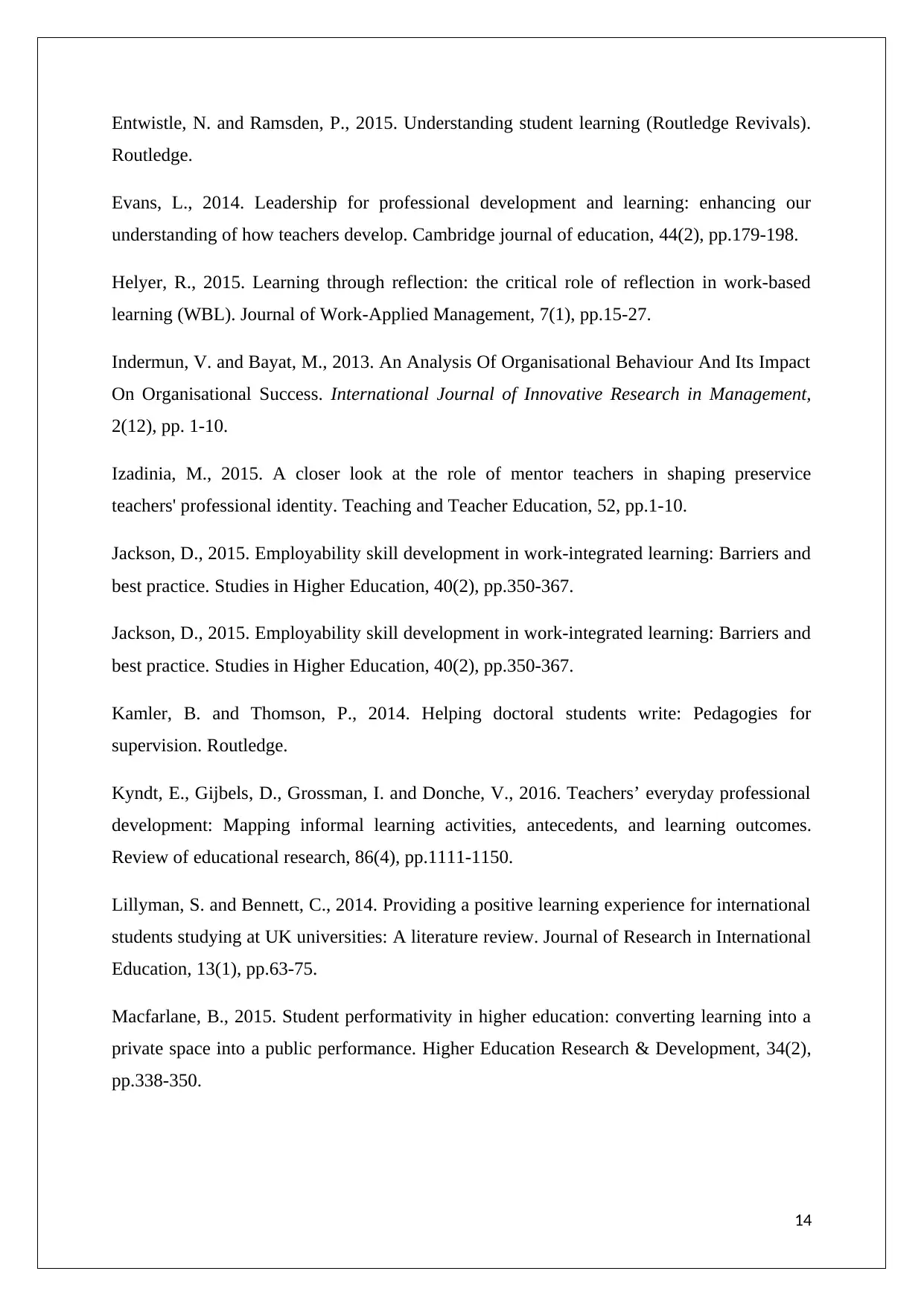
Entwistle, N. and Ramsden, P., 2015. Understanding student learning (Routledge Revivals).
Routledge.
Evans, L., 2014. Leadership for professional development and learning: enhancing our
understanding of how teachers develop. Cambridge journal of education, 44(2), pp.179-198.
Helyer, R., 2015. Learning through reflection: the critical role of reflection in work-based
learning (WBL). Journal of Work-Applied Management, 7(1), pp.15-27.
Indermun, V. and Bayat, M., 2013. An Analysis Of Organisational Behaviour And Its Impact
On Organisational Success. International Journal of Innovative Research in Management,
2(12), pp. 1-10.
Izadinia, M., 2015. A closer look at the role of mentor teachers in shaping preservice
teachers' professional identity. Teaching and Teacher Education, 52, pp.1-10.
Jackson, D., 2015. Employability skill development in work-integrated learning: Barriers and
best practice. Studies in Higher Education, 40(2), pp.350-367.
Jackson, D., 2015. Employability skill development in work-integrated learning: Barriers and
best practice. Studies in Higher Education, 40(2), pp.350-367.
Kamler, B. and Thomson, P., 2014. Helping doctoral students write: Pedagogies for
supervision. Routledge.
Kyndt, E., Gijbels, D., Grossman, I. and Donche, V., 2016. Teachers’ everyday professional
development: Mapping informal learning activities, antecedents, and learning outcomes.
Review of educational research, 86(4), pp.1111-1150.
Lillyman, S. and Bennett, C., 2014. Providing a positive learning experience for international
students studying at UK universities: A literature review. Journal of Research in International
Education, 13(1), pp.63-75.
Macfarlane, B., 2015. Student performativity in higher education: converting learning into a
private space into a public performance. Higher Education Research & Development, 34(2),
pp.338-350.
14
Routledge.
Evans, L., 2014. Leadership for professional development and learning: enhancing our
understanding of how teachers develop. Cambridge journal of education, 44(2), pp.179-198.
Helyer, R., 2015. Learning through reflection: the critical role of reflection in work-based
learning (WBL). Journal of Work-Applied Management, 7(1), pp.15-27.
Indermun, V. and Bayat, M., 2013. An Analysis Of Organisational Behaviour And Its Impact
On Organisational Success. International Journal of Innovative Research in Management,
2(12), pp. 1-10.
Izadinia, M., 2015. A closer look at the role of mentor teachers in shaping preservice
teachers' professional identity. Teaching and Teacher Education, 52, pp.1-10.
Jackson, D., 2015. Employability skill development in work-integrated learning: Barriers and
best practice. Studies in Higher Education, 40(2), pp.350-367.
Jackson, D., 2015. Employability skill development in work-integrated learning: Barriers and
best practice. Studies in Higher Education, 40(2), pp.350-367.
Kamler, B. and Thomson, P., 2014. Helping doctoral students write: Pedagogies for
supervision. Routledge.
Kyndt, E., Gijbels, D., Grossman, I. and Donche, V., 2016. Teachers’ everyday professional
development: Mapping informal learning activities, antecedents, and learning outcomes.
Review of educational research, 86(4), pp.1111-1150.
Lillyman, S. and Bennett, C., 2014. Providing a positive learning experience for international
students studying at UK universities: A literature review. Journal of Research in International
Education, 13(1), pp.63-75.
Macfarlane, B., 2015. Student performativity in higher education: converting learning into a
private space into a public performance. Higher Education Research & Development, 34(2),
pp.338-350.
14
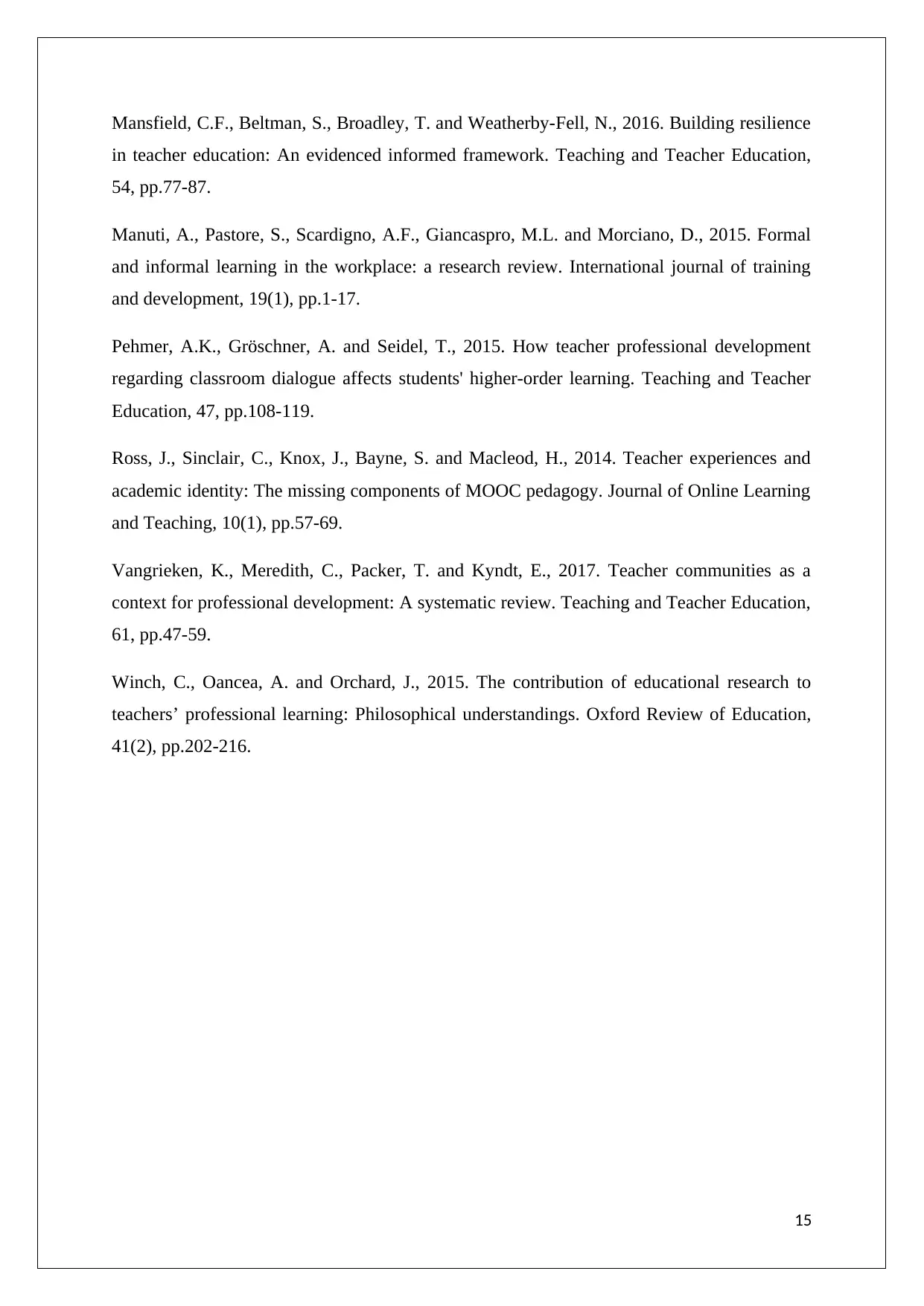
Mansfield, C.F., Beltman, S., Broadley, T. and Weatherby-Fell, N., 2016. Building resilience
in teacher education: An evidenced informed framework. Teaching and Teacher Education,
54, pp.77-87.
Manuti, A., Pastore, S., Scardigno, A.F., Giancaspro, M.L. and Morciano, D., 2015. Formal
and informal learning in the workplace: a research review. International journal of training
and development, 19(1), pp.1-17.
Pehmer, A.K., Gröschner, A. and Seidel, T., 2015. How teacher professional development
regarding classroom dialogue affects students' higher-order learning. Teaching and Teacher
Education, 47, pp.108-119.
Ross, J., Sinclair, C., Knox, J., Bayne, S. and Macleod, H., 2014. Teacher experiences and
academic identity: The missing components of MOOC pedagogy. Journal of Online Learning
and Teaching, 10(1), pp.57-69.
Vangrieken, K., Meredith, C., Packer, T. and Kyndt, E., 2017. Teacher communities as a
context for professional development: A systematic review. Teaching and Teacher Education,
61, pp.47-59.
Winch, C., Oancea, A. and Orchard, J., 2015. The contribution of educational research to
teachers’ professional learning: Philosophical understandings. Oxford Review of Education,
41(2), pp.202-216.
15
in teacher education: An evidenced informed framework. Teaching and Teacher Education,
54, pp.77-87.
Manuti, A., Pastore, S., Scardigno, A.F., Giancaspro, M.L. and Morciano, D., 2015. Formal
and informal learning in the workplace: a research review. International journal of training
and development, 19(1), pp.1-17.
Pehmer, A.K., Gröschner, A. and Seidel, T., 2015. How teacher professional development
regarding classroom dialogue affects students' higher-order learning. Teaching and Teacher
Education, 47, pp.108-119.
Ross, J., Sinclair, C., Knox, J., Bayne, S. and Macleod, H., 2014. Teacher experiences and
academic identity: The missing components of MOOC pedagogy. Journal of Online Learning
and Teaching, 10(1), pp.57-69.
Vangrieken, K., Meredith, C., Packer, T. and Kyndt, E., 2017. Teacher communities as a
context for professional development: A systematic review. Teaching and Teacher Education,
61, pp.47-59.
Winch, C., Oancea, A. and Orchard, J., 2015. The contribution of educational research to
teachers’ professional learning: Philosophical understandings. Oxford Review of Education,
41(2), pp.202-216.
15
1 out of 15
Related Documents
Your All-in-One AI-Powered Toolkit for Academic Success.
+13062052269
info@desklib.com
Available 24*7 on WhatsApp / Email
![[object Object]](/_next/static/media/star-bottom.7253800d.svg)
Unlock your academic potential
© 2024 | Zucol Services PVT LTD | All rights reserved.




